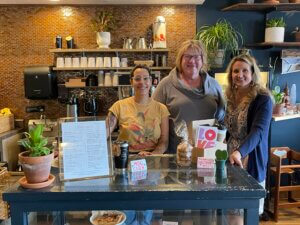Women’s business group opening doors for the overlooked
June 7, 2024
| By La Crosse Community Foundation |
WWBIC provides resources to build equity, self-sufficiency

Kara Schuster (right) of WWBIC uses social capital to open doors for entrepreneurs and business owners, like Nicole Elliott (left) who owns The Damn Tasty, that traditional financial systems often overlook. Mary Kessens, representing the Women’s Fund of Greater La Crosse, is in the center.
For nearly 40 years, the Wisconsin Women’s Business Initiative Corporation has been opening doors for those overlooked by traditional financial systems. Focusing on women, people of color, veterans, and individuals in rural or low-wealth communities, WWBIC provides access to financial capital and educational resources to build equity, economic self-sufficiency and community growth. And they couldn’t do any of it without social capital.
Kara Schuster is WWBIC’s Southwest Regional Director.
What common obstacles do women business owners face when seeking financial capital?
Women seeking financial capital today face several common obstacles that can make accessing funding more challenging than their male counterparts. These challenges include:
- Gender Bias and Stereotypes: Women often encounter gender bias from investors and lenders, leading to doubts about women’s capabilities and impacting the decision-making process of investors and lenders.
- Limited Access to Networks: Women may have limited access to these networks, which are often male-dominated, making it harder to find mentors, advisors, and potential investors.
- Lower Levels of Investment: Studies have shown that businesses founded by women tend to receive significantly less investment than those founded by men.
- Expectations of Higher Proof of Concept: Women entrepreneurs often must provide more evidence of their business’s viability and success to secure funding than their male counterparts.
- Balancing Business and Personal Life: Women are more likely to face challenges balancing business commitments with personal and family responsibilities, lessening their time to network and grow their businesses.
- Limited Access to Collateral: Women may have limited access to collateral due to historical disparities in asset ownership, affecting their ability to secure traditional bank loans.
- Discrimination in Funding Processes: Whether conscious or unconscious, discrimination can affect various stages of the funding process as women may face more skepticism or different expectations than men.
What role did social capital play in bringing WWBIC into existence?
By raising awareness about the challenges faced by women and minority business owners, WWBIC galvanized support from a broader spectrum of the community and decision-makers. This advocacy work helped secure funding, influence policy, and create a more favorable environment for small business development. Overall, social capital was not just an incidental aspect of WWBIC’s emergence; it was a deliberate strategy that leveraged human connections, trust, and collaborative networks to foster economic empowerment and entrepreneurship. By building and nurturing social capital, WWBIC created a supportive ecosystem that has helped thousands of entrepreneurs start and grow their businesses. WWBIC came out of the women’s economic empowerment movement and the micro-lending movement. Through social capital, we’ve grown in depth and breadth for our 36 years of true impact in the Coulee Region.
How are women entrepreneurs changing the face of Wisconsin business?
For decades, women-owned businesses have surpassed the start-up and growth rates of their male counterparts. As we know, women usually start businesses rather than buy existing businesses and often employ more women and underserved individuals than male-owned businesses. Women entrepreneurs’ growing presence and success have not only contributed to the state’s economic diversity and growth but have also led to the development of more inclusive and innovative business environments.
Women entrepreneurs are often at the forefront of adopting and implementing innovative business practices, including sustainable business models, social entrepreneurship, and digital transformation. Their approach to problem-solving and emphasis on collaboration and community engagement often lead to novel solutions that address both market needs and societal challenges.
Many women entrepreneurs are also deeply committed to their local communities and often design their business models to give back to these communities. Whether through charitable initiatives, local sourcing, or community-based services, these businesses contribute to the social and economic well-being of their areas.
Overall, women entrepreneurs are making significant contributions to the vitality and character of Wisconsin’s business environment. Their achievements enhance economic growth and innovation and lead to more inclusive, equitable, and sustainable business practices. Through their efforts, they are reshaping the narrative around entrepreneurship and leadership in the state.
The overall sales of women-owned businesses speaks for itself. NOW, women-owned businesses are truly a key part of our overall economic growth and vitality in our nation.
Reprinted with permission from the La Crosse Tribune.
